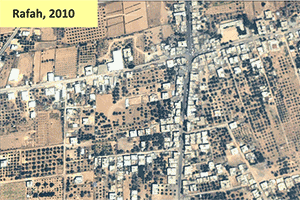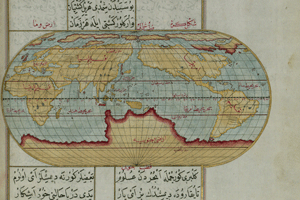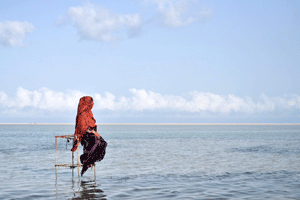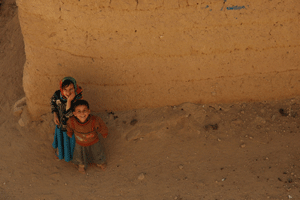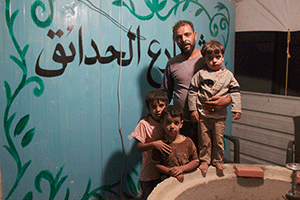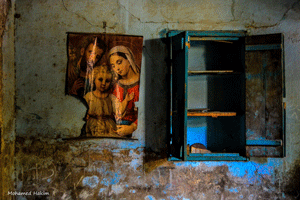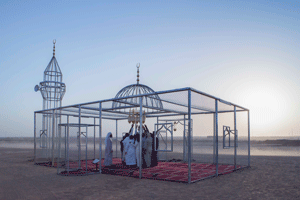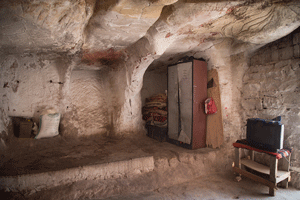Latest Articles From
Arab World
Like an Occupying Army, Egypt Battles its Own Citizens in the Sinai
Time lapse of the destruction of a Rafah neighborhood. Illustration: IB
From San Francisco
In the satellite pictures, it looks as if someone has taken an eraser to the lines of houses and farms, smearing them over the arid landscape. But it is Egyptian army bulldozers that are blotting Rafah away, block by block. It is the desolation of Sisi, the most shocking and lurid of the many ways that Egypt’s military has gotten everything wrong in Sinai, behaving like an occupying army on its own land, fighting a terrorist insurgency in the most inept way possible.
The last time I visited Northern Sinai, it was a windy winter week in 2008, under a morose sky.
A Map of War Without End
Oval Map of the World, from Book on Navigation. Originally composed in 932 AH / 1525 CE and dedicated to Sultan Süleyman I ("The Magnificent"). Walters Art Museum.
From San Francisco
Last week’s American air attack on a Syrian army convoy in the country’s southeastern desert passed largely unnoticed in the US media, but it suggests that Donald Trump and his generals are electing to shift to a strategy of long term geographic isolation of Bashar al-Assad’s regime.
Syria’s civil war began in widespread Arab Spring demonstrations demanding that the country’s hereditary dictator leave office.
The Prince Who Only Charms Journalists
Deputy crown prince Mohammed Bin Salman
From Al Akhbar
Though they are one of the world’s most authoritarian and dangerous regimes, the family that rules the self-titled Kingdom of Saudi Arabia gets a remarkably free pass from the international media. In this close look at the scheming of the kingdom’s deputy crown prince, who is angling to jump the line of succession and succeed his aging father, Al-Akhbar’s Sabah Ayyoub shows how the millions of dollars the kingdom’s rulers spend on American public relations firms every year bend the western press to serve their interests.
Prince Mohammed Bin Salman regularly invites western journalists to visit him in his Riyadh office
Invasion as Investment Opportunity: Emirati Capital Follows Its Troops into Yemen
Socotra Island, Yemen. Photo: Amira Al Sharif
From Al Safir Al Arabi
For the clever Sheikhs who run the United Arab Emirates, jumping headfirst into Saudi Arabia’s ill-considered invasion of Yemen was clearly a business decision, writes Abdelhadi Khalaf. Once they had secured their hold on a few ports, airports, and developable tourist destinations, they stopped participating in the military operations and got down to the business of securing their new assets.
When Saudi Arabia launched an attack on Yemen in March 2015,
Confronting Goliath, a Yemeni David
Saada. North of Yemen. Photo CC: Dietmar.
From Al Akhbar
Saudi Arabia’s bloody intervention in Yemen has not merely bogged down, writes Yahya al-Shami, Al Akhbar’s correspondent in northern Yemen: it has induced the ruling princes to pursue such questionable strategies as recruiting vast numbers of religious extremists into the armed forces.
For two years, Saudi Arabia has been trying with little success to take back a vast strip of its own territory, comprising dozens of military outposts and Saudi towns
On a Trickle of Midnight Electricity, Syria’s Refugees See Home Receding
Photos: Khalid Al Basheer/7iber.
From 7iber
In a blaze of publicity, the Jordanian government and the UN announced last summer that the largest camp for refugees of Syria’s civil war would at last get legal electricity to replace its dangerous hodgepodge of illicit hookups. But in the precarious life of a refugee camp, even apparent improvements have their pitfalls, writes Dana Jebril.
“A grandmother will no longer tell stories to her grand children in the dark and children can now study in the evenings..."
In Egypt, a Parallel Justice System to Further Oppress Copts
Inside one of the torched houses at Karm village in Upper Egypt. Photo: Mahmoud Hakim
From Al Safir Al Arabi
Periodic outbreaks of mob violence against Egypt’s small Coptic Christian minority have long been an ugly feature of life along the Nile, particularly in the villages and towns in rural upper Egypt. Since the earthquake that was the Arab Spring rolled through Egypt in 2011, writes Ahmed Abdel Alim, Copts seeking justice for murder, arson, and beatings are increasingly forced to accept non-judicial mediation sessions, instead of the prosecution of their attackers.
In rural Egypt, traditional ‘Urfi courts are an ancient way of resolving disputes
We Are Niggers in Algiers
Photo Nassim Rouchiche.
From Echoes of My Voice
There is a kind of synchronicity to Bongani Ncube-Zikhali’s experience of racist discrimination as a black African at the hands of official Algeria. A parallel to what Algerians themselves face on the other side of the Mediterranean, and a melancholic coda to Algeria’s once-proud role in the Pan-African and non-aligned world of the 1970s.
It is night time as the bus speeds through the Maghrebi countryside on its way to Algiers.
How to Succeed in the Business of Ruling by Not Trying to Educate Anyone
Art installation: "Paradise Has Many Gates" by Ajlan Gharem
From Al Safir Al Arabi
From within the strange kingdom of Saudi Arabia, an impassioned critique of a public education system so afraid of dissent that it stuffs the kingdom’s young minds with religion and grammar to crowd out any other knowledge. Dissent of any kind, from imported liberality to the self-reinforcing growth of ‘salafi’ fundamentalists, is at the root of the fear, writes Jamal Mohamed Taqqi:
A public attack by Saudi Arabia’s previous education minister on the very system of instruction he oversaw until not long ago:
Return to the Ancestral Cave
Petra, Jordan. Photos: Hossam Dana/7iber
From 7iber
A winding mountain gorge, immense temples and edifices carved into its narrow rock walls; a vast and complex water collection and storage system to wring an artificial oasis out of the desert: Petra can seem more like a fantasy than a real place. But this Jordanian valley, once the center of a desert empire, remained until the 1980s an inhabited town, its inhabitants living in homes carved into the rock among the two thousand year-old temples. And now they are coming back.
The people of Um Sayhun village in the Petra region have plenty of the same grievances of other underdeveloped villages in Jordan
1 2 3 … 15 Next
